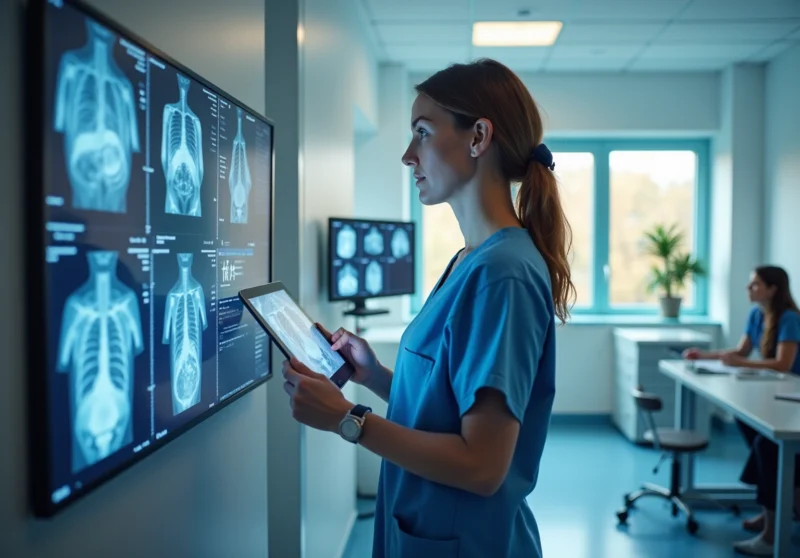
The article delves into the multifaceted applications of AI in healthcare, underscoring its potential to enhance operational efficiency, elevate diagnostic accuracy, and streamline administrative processes. By showcasing specific AI applications such as:
it illustrates the transformative impact AI can have on medical services. This transformation not only aims to improve patient outcomes but also addresses pressing challenges, including data privacy and algorithmic bias.
Artificial Intelligence (AI) is revolutionizing the healthcare landscape, presenting unprecedented capabilities that enhance efficiency and accuracy in medical services. From diagnostic imaging to predictive analytics, the applications of AI not only streamline operations but also significantly improve patient outcomes. However, as healthcare systems embrace these transformative technologies, they encounter critical challenges, including data privacy concerns and the pressing need for transparency in AI algorithms.
How can the healthcare industry effectively balance the transformative potential of AI with the imperative to safeguard patient information and maintain trust? This question is central to navigating the future of healthcare.
Artificial Intelligence (AI) in medicine represents a pivotal advancement, leveraging sophisticated algorithms and software designed to replicate human intelligence in the analysis of intricate medical data. This encompasses technologies such as machine learning, natural language processing (NLP), and robotics, empowering systems to learn from extensive datasets, identify patterns, and make informed decisions with minimal human oversight. The uses of AI in healthcare are vast, encompassing diagnostic tools that assess medical images as well as virtual health assistants that enhance user engagement and support. The integration of AI is essential in improving clinical decision-making processes, enhancing outcomes for individuals, and streamlining administrative tasks, thereby transforming the landscape of medical services.
Recent advancements in AI algorithms have markedly improved their efficacy in medical environments. For example, the automated classification of medical images has emerged as a leading application, showcasing the ability to meet or even surpass human expert performance in diagnosing conditions across various specialties. Furthermore, AI tools such as the HCC Assistant from Inferscience illustrate how AI can enhance coding precision and effectiveness, ultimately optimizing funding from Medicare Advantage recipients. Inferscience’s HCC coding solutions specifically address the challenges posed by information silos by unifying patient information through advanced NLP integration, which is critical for precise risk adjustment and streamlined workflows for medical providers.
Healthcare leaders recognize the transformative potential of AI, with many emphasizing the uses of AI in healthcare to enhance medical information analysis and decision-making. As AI continues to evolve, the uses of AI in healthcare are expected to expand, fostering a more personalized, precise, and predictive approach to medical service delivery. This evolution not only elevates the quality of care but also addresses the pressing challenges faced by medical providers in managing complex patient information and administrative responsibilities.

The evolution of artificial intelligence in healthcare, which includes various uses of AI in healthcare, began in the 1950s with the development of early algorithms for medical diagnosis. With the growth of computing power and the increasing availability of information, AI began to flourish.
The 1980s marked the introduction of machine learning, facilitating more complex analyses that laid the groundwork for significant advancements. The emergence of electronic health records (EHRs) in the 2000s further revolutionized the landscape, offering extensive datasets for AI systems to utilize.
In recent years, the uses of AI in healthcare have expanded dramatically, especially in:
Innovations in deep learning and natural language processing have been crucial in this surge, enabling more accurate diagnoses and customized treatment plans. Moreover, the integration of AI technologies has greatly enhanced medical risk adjustment processes, streamlining workflows and reducing human error in Hierarchical Condition Category (HCC) coding.
This optimization not only improves Medicare Advantage funding but also elevates the quality of health information management, ultimately leading to better outcomes for individuals and increased operational efficiencies across medical environments. This illustrates the transformative potential of the uses of AI in healthcare within the medical field.
AI is revolutionizing healthcare with various uses of AI in healthcare that enhance efficiency and accuracy.
The uses of AI in healthcare not only streamline operations but also contribute to improved outcomes for individuals and operational efficiencies across medical systems.
The uses of AI in healthcare through the incorporation of AI in medical services present a multitude of advantages, including significant improvements in efficiency, enhanced diagnostic accuracy, and a reduction in administrative burdens. For instance, AI technologies can automate routine tasks such as client registration and data entry, allowing healthcare providers to allocate more time to supporting individuals. Statistics suggest that AI can improve health outcomes by 30% to 40% while concurrently lowering treatment expenses by up to 50%.
Inferscience’s HCC Assistant exemplifies this transformation by utilizing advanced natural language processing (NLP) to streamline HCC coding workflows, significantly reducing manual effort and allowing providers to focus more on care. Customer testimonials highlight the HCC Assistant’s user-friendliness and effectiveness in simplifying the coding process, showcasing its role in improving risk adjustment factors (RAF scores) and ensuring providers receive maximum funding from Medicare Advantage contracts. Furthermore, the Claims Assistant conducts real-time gap analysis on claims data, proposing HCC codes that might have been missed, thereby improving billing precision and offering a clearer perspective on individual conditions and expected medical expenses.
Despite these benefits, several challenges persist in the implementation of the uses of AI in healthcare settings. Data privacy concerns remain crucial, necessitating strong regulatory frameworks to protect sensitive individual information. Inferscience’s commitment to data security, evidenced by their SOC2 Type II certification, addresses these concerns and enhances the credibility of AI solutions. Additionally, the potential for algorithmic bias poses risks that could undermine the effectiveness of AI solutions. Healthcare professionals emphasize the importance of transparency and accountability in AI systems to maintain trust among providers and patients alike.
Furthermore, successful AI integration necessitates continuous training and support for medical personnel to guarantee they can efficiently adjust to new technologies. However, medical leaders must navigate the complexities of AI adoption, including addressing provider burnout and ensuring that the expected outcomes align with operational goals.
In summary, while the uses of AI in healthcare provide transformative potential, as demonstrated by Inferscience’s innovative solutions, it is essential to address the associated challenges to fully realize its benefits.

AI is poised to fundamentally reshape the medical landscape in the coming years through various uses of AI in healthcare. The integration of AI with telemedicine stands out as a key trend, enhancing remote monitoring and virtual consultations, thereby making medical services more accessible. For instance, AI-driven telehealth advancements are expected to significantly boost user engagement and optimize care delivery, addressing the growing demand for remote healthcare solutions. The telehealth industry has already witnessed substantial growth, marked by a notable increase in the utilization of AI technologies to aid in clinical decision-making and individual management.
Moreover, the uses of AI in healthcare through advancements in personalized medicine are helping to tailor treatments based on specific individual data, resulting in improved treatment outcomes. This innovative approach not only minimizes trial-and-error prescribing but also enhances overall health management by aligning therapies with patients’ unique genetic and lifestyle profiles. Additionally, the uses of AI in healthcare, especially in drug discovery, are gaining traction, potentially expediting the development of new therapies and enhancing the efficiency of clinical trials.
As we look toward 2025, the medical sector is expected to experience a surge in the uses of AI in healthcare, driven by the imperative for more efficient, patient-centered care. Collaboration among medical providers, technology developers, and regulatory bodies will be crucial to ensure these innovations are implemented effectively and ethically. As industry leaders assert, the future of AI in healthcare transcends mere technology; it is fundamentally about augmenting human capabilities and enhancing patient outcomes through thoughtful integration and responsible practices.
The exploration of artificial intelligence (AI) in healthcare underscores its transformative potential in enhancing efficiency, accuracy, and patient outcomes. By integrating sophisticated algorithms and advanced technologies, AI is reshaping the medical landscape—improving diagnostic imaging and streamlining administrative tasks. This central idea emphasizes that AI transcends mere technological advancement; it serves as a critical tool for modernizing healthcare practices and enhancing service delivery.
Key arguments throughout the article highlight various applications of AI, including:
Each application uniquely contributes to enhancing operational efficiencies, reducing administrative burdens, and ultimately improving patient care. The historical development of AI in healthcare illustrates its evolution from simple algorithms to complex systems capable of making informed decisions based on vast datasets. As AI continues to advance, its role in personalized medicine and telehealth is expected to expand, further improving healthcare delivery.
Looking ahead, the integration of AI in healthcare signifies a shift towards more personalized, efficient, and proactive medical services. As the industry progresses, addressing challenges such as data privacy, algorithmic bias, and the necessity for continuous training will be essential for harnessing AI’s full potential. Embracing these innovations not only enhances patient experiences but also positions healthcare providers to effectively meet the demands of modern medicine. Engaging with AI technologies today will pave the way for a more efficient and patient-centered healthcare system in the years to come.